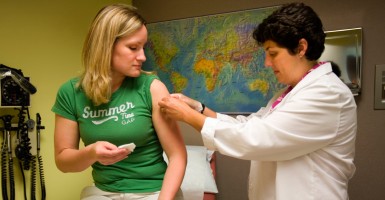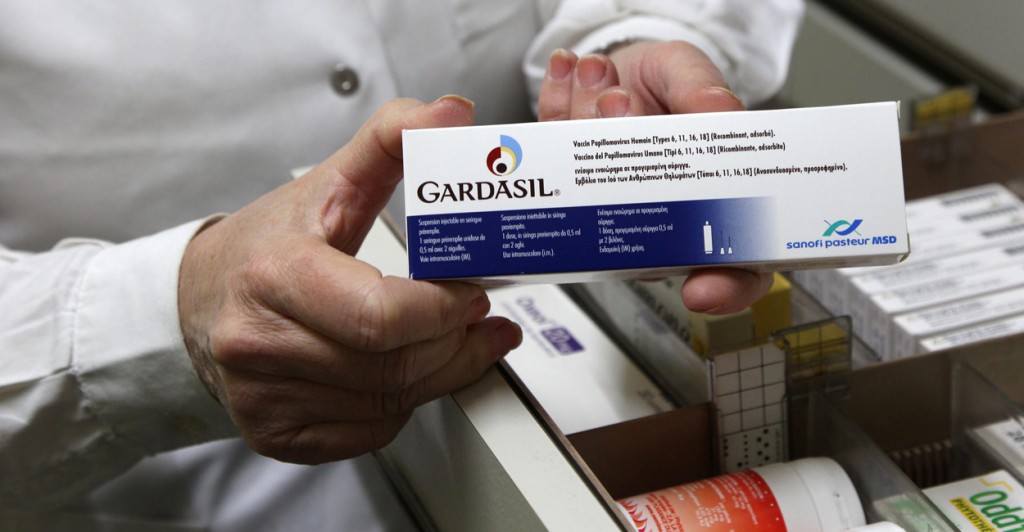It appears to be a neutral source in a prestigious medical journal: An article defending the controversial human papillomavirus (HPV) cervical cancer vaccine. It criticizes the Japanese government’s decision to stop promoting the vaccine amid concerns about injuries. And it implies patients are incorrectly blaming the HPV vaccine for unrelated ills.
Critics say it’s an example of hidden cronyism among physicians and corporations who use medical journals to influence public policy.
“Individuals who have the misfortune to be unwell with rare or difficult to treat disorders have been encouraged by antivaccination advocates to blame the HPV vaccine, especially in an unrestrained media environment,” writes lead author Dr. Sharon J.B. Hanley.
But a key disclosure is omitted from the article: Hanley’s financial ties to Merck and GlaxoSmithKline—makers of the multi-billion dollar HPV vaccines promoted in the article.
Critics say it’s an example of hidden cronyism among physicians and corporations who use medical journals, regarded as pillars in the medical community, to influence physicians and public policy.
Debate Over Disclosure
In the HPV vaccine article, Hanley reported receiving fees for lectures from “Japan Vaccine” and “the Japanese Expert Board for the Eradication of Cervical Cancer.”
What’s omitted is the disclosure that “Japan Vaccine” is a venture of GlaxoSmithKline; and “the Japanese Expert Board” has received hundreds of thousands of dollars from Merck and GlaxoSmithKline. GlaxoSmithKline makes Cervarix vaccine. Merck makes Gardasil.
“It’s important to acknowledge and recognize conflicts of interest could influence what someone who’s viewed as an expert in the field says and how it’s interpreted,” says Dr. Michael Carome, an internationally recognized expert on research ethics and head of the Health Research Group at watchdog Public Citizen.
Contacted by email, Hanley insisted she followed The Lancet’s conflict of interest disclosure policy. She added that HPV vaccine safety data has been analyzed by respected international bodies and “commercial entities cannot influence this.”
“I would disagree with that,” says Carome. “With any commercial product, drugs or vaccine, an author’s financial conflicts of interest could influence how they are describing or recommending a particular treatment or intervention.”
Reached for comment, The Lancet indicated that, upon further review, Hanley’s disclosure did not comply with their conflict of interest disclosure policy.
“Thank you for bringing this to our attention,” Lancet senior editor Audrey Ceschia wrote to me in an email. “We will publish a correction stating that the [Japanese Expert] Board received funding from [GlaxoSmithKline and Merck].” Hanely would not confirm to us that Japan Vaccine is a GlaxoSmithKline venture, but Ceschia later acknowledged that it is.

Yui Ito, a Japanese teenager, is an alleged victim of the HPV vaccine Cervarix. In this photo from Oct. 12, 2013, she performs at an audition in Tokyo. Yui, who has suffered partial paralysis and pain since 2011, uses a wheelchair except when in bed, but stands to play when performing. (Photo: Kyodo/Newscom)
‘A Very Bad Idea’
Critics say too often corporate influence encroaches on respected scientific journals—unbeknownst to the physicians and patients who read them.
Three former senior editors of the New England Journal of Medicine (NEJM) recently blasted what they view as some medical journals, including their former employer, allowing and defending drug industry influence.
Their essay in the British Medical Journal is titled, “Justifying conflicts of interest in medical journals: a very bad idea.”
“In a series of rambling articles, one of the [NEJM’s] national correspondents, Lisa Rosenbaum, supported by the editor-in-chief, Jeffrey Drazen, tried to rationalise financial conflicts of interest in the medical profession,” write former NEJM heavyweights Robert Steinbrook, Jerome Kassirer and Marcia Angell.
“It’s important to be transparent about conflicts of interest so readers can make their own judgement,” says @Public_Citizen’s Michael Carome
“[W]e find it sad that the medical journal that first called attention to the problem of financial conflicts of interest among physicians would now backtrack so dramatically and indulge in personal attacks on those who disagree. … Put simply, financial conflicts of interest in medicine are not beneficial, despite strained attempts to justify them and to make a virtue of self interest.”
Carome says disclosure is crucial:
“It’s important to be transparent about conflicts of interest so readers can make their own judgement about whether real or apparent conflicts of interest are being reflected in what authors are saying.”
Hanley declined to provide a list of pharmaceutical industry compensation she has received.
Japan began offering free HPV vaccine in December of 2010. In June of 2013, amid concerns about adverse event reports, the Japanese Ministry of Health, Labour, and Welfare instructed local governments and doctors to cease promoting the HPV vaccine.





























